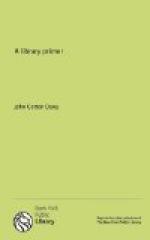CHAPTER XXVIII
Pamphlets
Save all pamphlets having to do with local history, and save also those of a general nature which promise ever to be of any importance. In a small library, however, or in any library in which money for salaries is limited, and the work to be done in the regular matter of attending to the public, lending books, etc., is great, do not waste time in trying to arrange or catalog pamphlets. Simply let them accumulate, arranging them roughly in classes. Bind at once only those that seem absolutely to demand it. In the history of almost any library the time will come when it will be possible to sort out pamphlets, arrange them properly, catalog such as are worth it, bind them singly or in groups, and incorporate them into the library. But any system of arranging and sorting pamphlets which does anything more than very roughly to arrange and store them, and attempts to make them, without much labor, accessible to the general public, is almost sure to be a failure. This is not true of pamphlets to which the public has not access. But pamphlets not fully cataloged and not accessible to the public are, no matter how scientifically arranged, almost useless plunder. To keep them clean and in order nothing is as good as a pamphlet case, which any boxmaker can make, of cardboard about 9 inches high, 7 inches deep, and 2 inches thick, open at the back. They will cost from 4 to 12 cents each, according to quality of board used and quantity ordered. For holding a few pamphlets together temporarily Ballard’s “klips” are best. Sold by H.H. Ballard, Pittsfield, Mass.
[Illustration: L.B. pamphlet case. (Various sizes.)]
CHAPTER XXIX
Public documents
Adelaide R. Hasse, of the New York Public library
How issued
Government documents are issued in two sets or editions, viz.: the Congressional or sheep, and the Departmental or cloth. The annual reports of the heads of departments, with many of the serial and occasional publications of the various departments, are contained in the sheep set, and in addition, all the reports of committees, and records of the transactions of congress, except the debates which are contained in the Congressional record. The cloth set contains all the publications of the various departments, irrespective of the fact that some of them may have appeared in the sheep set.
To whom issued
The depository libraries receive the sheep set by law from the superintendent of documents. Each department has its own list of “exchanges” (i.e., designations) which receive gratis the publications of that department intended for general distribution. Non-depository libraries receive their documents regularly from the departments when on the department exchange list, or irregularly from their representatives in congress. “Remainder libraries” receive from the superintendent of documents such documents as can be supplied from the fractional quotas sent to him after the editions ordered for the use of congress have been equally divided among the senators and representatives.




